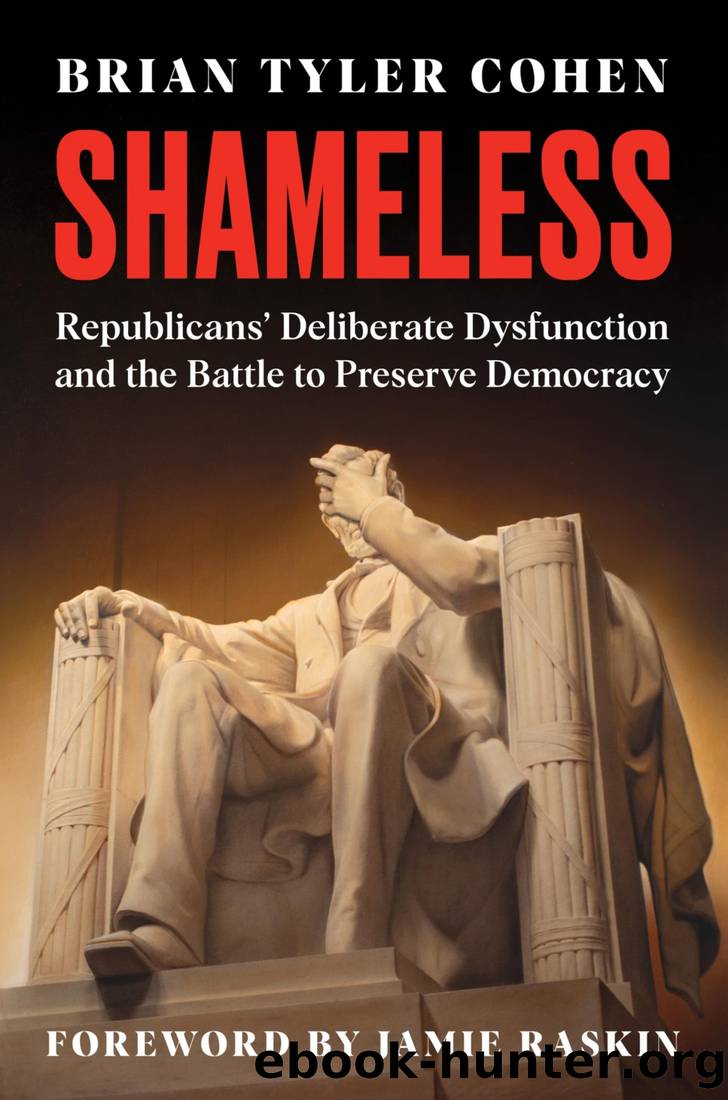Shameless: Republicans' Deliberate Dysfunction and the Battle to Preserve Democracy by Brian Tyler Cohen

Author:Brian Tyler Cohen [Cohen, Brian Tyler]
Language: eng
Format: epub
Tags: Political Science, Political Process, Political Parties, Political Ideologies, Conservatism & Liberalism, Commentary & Opinion
ISBN: 9780063392885
Google: dIbsEAAAQBAJ
Amazon: 0063392887
Publisher: Harper
Published: 2024-08-13T00:00:00+00:00
6
If You Build It . . .
Republicans of another era had the foresight and discipline to create their own media distribution system, with a long-term vision. It would be effective at reaching its intended base, and it would deliver content catered to the party and its supporters. The machine goes as far back as the mid-1960s, when Richard Viguerieâsometimes known as the âfunding father of the conservative movementââstarted doing an end run around traditional media by using direct mail and building up extensive lists (with an estimated 3.5 million names) of conservative supporters. Many of those on the lists would become donors to the cause. Over the decades, his company has sent more than two billion letters, with the aim to, according to the Washington Post, âbuild support for âNew Rightâ causes that range from cutting taxes to bolstering family values.â
When Lewis Powell shared his influential memo with corporate America, he knew that success would hinge on discipline and collective persistence. âStrength lies in organization,â he wrote, âin careful long-range planning and implementation, in consistency of action over an indefinite period of years, in the scale of financing available only through joint effort, and in the political power available only through united action and national organizations.â
The Fairness Doctrine had come into play about a decade and a half prior, provoked by lawmakers concerned that the three main television networksâNBC, ABC, and CBSâhad a monopoly on the press and could use it to set a biased public agenda. It mandated that the networks give time to contrasting views on issues of public importance. Congress gradually built up support for the doctrine, and the Federal Communications Commission (FCC) called it the âsingle most important requirement of operation in the public interest.â The doctrine kept broadcasters from presenting the news from a single point of view, was upheld in the Supreme Court, and remained in place until the Reagan administration. In 1985, the FCC under Mark Fowler asserted that it was in fact not in the public interest, and that enforcement violated the First Amendment.
The doctrine was rolled back during Reaganâs second term, despite complaints that it was the only guardrail that would prevent broadcast journalists, if left unchecked, from verbally assaulting politicians and their policies on-airâpaving the road for the likes of Limbaugh. It was repealed by the FCC on August 5, 1987. Members of Congress opposed the decision, with South Carolina Democrat Ernest F. Hollings arguing that it was âwrongheaded, misguided, and illogical.â Earlier in the year, Congress had attempted to codify the Fairness Doctrine in new legislation, the Fairness in Broadcasting Act, which had passed, only to be vetoed by President Reagan in June.
Reaganâs intervention would give a wide berth and that much more freedom to, among others, Limbaugh, the grand wizard of making the airwaves partisan while spreading unchecked lies and leaning way, way into his own bias and agenda, both of which targeted liberals as the enemy. Limbaugh, not known for his humility, said of his show: âThis has not been an AM-radio revolution exclusively; it has been a conservative-media revolution.
Download
This site does not store any files on its server. We only index and link to content provided by other sites. Please contact the content providers to delete copyright contents if any and email us, we'll remove relevant links or contents immediately.
The Secret History by Donna Tartt(19086)
The Social Justice Warrior Handbook by Lisa De Pasquale(12190)
Thirteen Reasons Why by Jay Asher(8909)
This Is How You Lose Her by Junot Diaz(6886)
Weapons of Math Destruction by Cathy O'Neil(6279)
Zero to One by Peter Thiel(5801)
Beartown by Fredrik Backman(5754)
The Myth of the Strong Leader by Archie Brown(5507)
The Fire Next Time by James Baldwin(5442)
How Democracies Die by Steven Levitsky & Daniel Ziblatt(5218)
Promise Me, Dad by Joe Biden(5153)
Stone's Rules by Roger Stone(5087)
A Higher Loyalty: Truth, Lies, and Leadership by James Comey(4962)
100 Deadly Skills by Clint Emerson(4925)
Rise and Kill First by Ronen Bergman(4788)
Secrecy World by Jake Bernstein(4753)
The David Icke Guide to the Global Conspiracy (and how to end it) by David Icke(4717)
The Farm by Tom Rob Smith(4507)
The Doomsday Machine by Daniel Ellsberg(4490)
